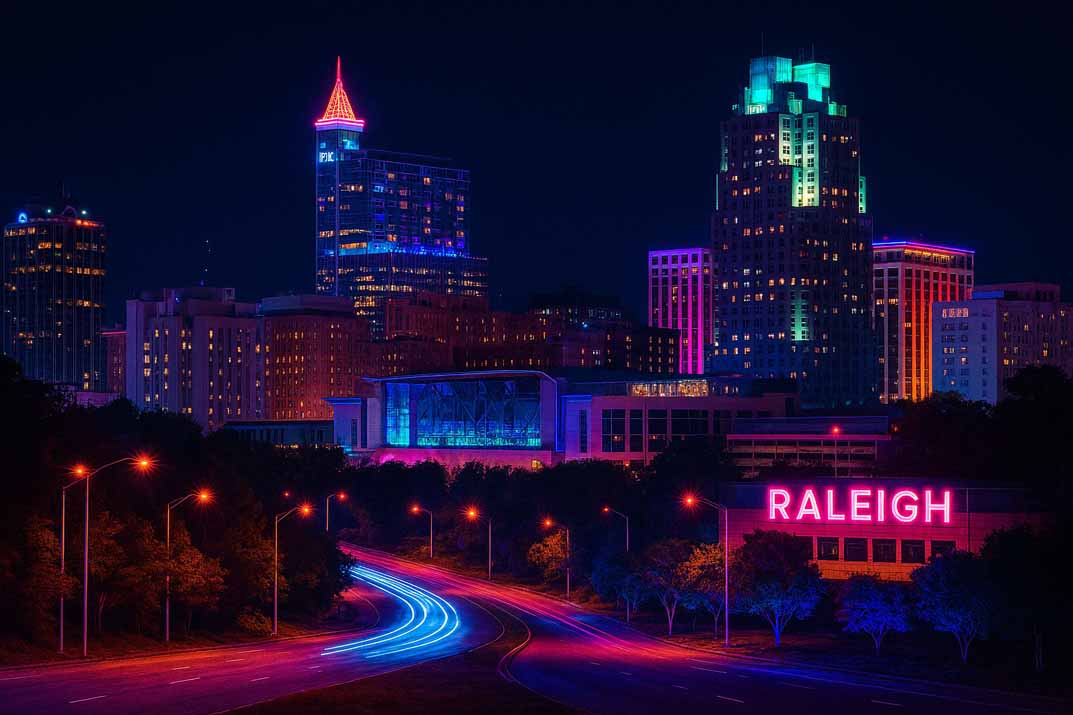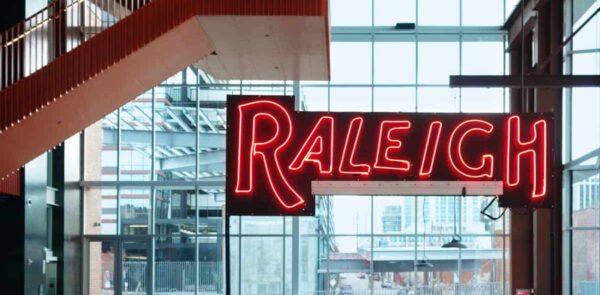
Jump to a section:
Raleigh, North Carolina—often praised for its thriving tech presence in the Research Triangle and its beautiful oak-lined streets—has become a prominent destination for new residents, families, and young professionals. But while Raleigh boasts a big-city feel and major educational institutions, it still retains a community spirit that sets it apart. Part of that spirit is the remarkable surge in “local first” attitudes: residents actively seeking out and supporting small, homegrown businesses in lieu of corporate chains or faraway online retailers. Through our experience at Emulent, we’ve noticed this momentum is more than just a passing trend: it’s a sustained cultural shift, one that resonates with Raleigh’s history, current growth, and vision for the future.
Balancing Modern Growth with Timeless Southern Roots
Emulent’s Perspective on Raleigh’s Evolving Identity
One of the most captivating features of Raleigh is its blend of historic charm and modern innovation. The city has rapidly expanded into a tech and education powerhouse, thanks to proximity to research universities and the bustling Research Triangle Park. Yet, Raleigh never quite lost its hometown warmth and neighborly feel. Residents enjoy the pace of a city that’s constantly innovating—while preserving a strong sense of heritage and a welcoming community vibe. This dual nature encourages them to seek out small businesses that similarly fuse tradition and contemporary flair.
Key Observations
- Historic Neighborhoods in Revival: Areas like Oakwood or Boylan Heights have seen new life breathed into old homes and local shops, reinforcing a community-driven identity that cherishes local success stories.
- Emerging Tech Scenes: Entrepreneurs and startups—particularly in software, biotech, and green tech—have flocked to Raleigh. They appreciate local resources and are often keen on forging relationships with neighborhood businesses to strengthen a sense of place.
- Blended Demographics: Longtime residents share sidewalks with transplants from around the country, many arriving for job opportunities or to raise families. These newcomers often gravitate to local brands for unique North Carolinian experiences.
How to Capture Raleigh’s Balanced Spirit
- Nod to the City’s History: If your brand has roots in Raleigh’s past—such as operating in a restored historic building or referencing local traditions—highlight them in your décor, packaging, or website storytelling.
- Marry Tradition with Innovation: A café might showcase Southern-inspired pastries alongside modern latte art. A local workshop might use heritage manufacturing techniques but offer sleek, tech-savvy user experiences for ordering. These gestures reflect the city’s dual identity.
- Collaborate with Tech Initiatives: Sponsor a hackathon at NC State or run a discount for employees of local startups. By bridging the city’s established Southern roots and new tech expansions, you’ll engage multiple audiences simultaneously.
Multicultural Communities Driving a Tapestry of Local Offerings
Emulent’s View on Raleigh’s Diverse Influences
Raleigh’s growth has brought in families, students, and professionals from around the globe. That rich diversity has redefined the city’s culinary landscape, retail mix, and cultural life. From authentic Mexican taquerías to Korean bakeries near Cary and Middle Eastern markets dotting North Raleigh, local entrepreneurship thrives on a multiplicity of backgrounds. These multicultural roots reinforce a collective desire to support small brands that celebrate Raleigh’s increasingly cosmopolitan identity.
Key Observations
- Ethnically Diverse Neighborhoods: Suburbs like Cary, Morrisville, and the Midtown region exhibit heavy multicultural influences, with local restaurants and shops forming thriving mini-districts of international tastes and traditions.
- Cross-Cultural Festivals and Events: Raleigh’s events—like the International Festival of Raleigh—shine a spotlight on smaller vendors offering authentic crafts or foods. Regular attendance fosters pride in up-and-coming micro-enterprises.
- Inclusive Brand Appeal: Businesses that show respect for diverse cultures—like using bilingual signage or carrying specialty products from multiple regions—often capture a broader slice of Raleigh’s population.
Ways to Engage Raleigh’s Cultural Tapestry
- Tailor Offerings to Local Demographics: If your area has a notable Indian community, consider stocking relevant grocery items or creating events that highlight Diwali festivities. Show genuine willingness to serve diverse needs.
- Collaborate with Cultural Groups: Partner with local nonprofits or heritage clubs for special promotions, demos, or charitable efforts. This approach places your brand directly in front of loyal, engaged groups.
- Highlight Inclusivity in Marketing: Feature staff or customers from various backgrounds in visuals. Use short anecdotes or quotes that reflect the shared experiences of Raleigh’s many cultures.
Emphasis on Authenticity and Transparent Sourcing
Emulent’s Thoughts on the City’s Quality-Over-Quantity Mindset
Like many modern urban environments, Raleigh fosters an audience that wants to know where their products come from and how they’re made. Whether it’s produce from a nearby farm in Wake County, coffee beans procured via fair-trade networks, or artisanal crafts using locally sourced materials, Raleigh shoppers often look beyond the price tag for authenticity. They see local buying as a way to reduce environmental footprints and safeguard the city’s economic resilience—investing in small brand owners who maintain honest supply chains.
Key Observations
- Farm-to-Table Movement: Eateries boasting “locally grown produce” or “supporting NC farmers” typically earn enthusiastic crowds, especially if they share behind-the-scenes glimpses (like farm visits or short profiles of the farmers).
- Artisan Crafts and Goods: Boutique stores highlighting regionally handmade soaps, wooden furniture, or jewelry see strong local interest—Raleighites enjoy finding distinctive items that differ from mass-produced lines.
- Green and Ethical Production: The city’s well-educated population, including many eco-conscious families, values fair wages, cruelty-free policies, or plastic-free packaging. If you meet these standards, display them proudly.
Tips for Showcasing Authentic and Local Qualities
- Use Visual Proof: Post photos of your produce supplier’s farmland or the artisan who crafts your home décor. Visual context resonates better than claims alone.
- Label Clearly in Store or Online: If a t-shirt is designed by a Raleigh artist, add a small sign or tag stating “Locally designed by [Name], supporting local art scene.” This fosters an instant emotional link.
- Offer Transparency Online: Dedicate a webpage or social media posts to the story behind your supply chain. People who see the “why” behind your brand’s approach are more likely to trust you.
Demand for Community Involvement and Local Partnerships
Emulent’s Advice on Solidifying Neighborhood Ties
Though Raleigh is part of the fast-paced Research Triangle, neighborhoods still function as supportive ecosystems where business owners know each other, sponsor local sports teams, or share vendor booths at weekend pop-up markets. Residents pay attention to these networks: who’s collaborating with which nonprofit, or if a store invests in local events. When they see a brand consistently involved and giving back, it cements their impression that you’re genuinely part of Raleigh’s story.
Key Observations
- Local Festivals and Markets: Think of events like the Raleigh Downtown Farmers Market or cultural street fairs—these draw thousands, providing prime visibility for smaller brands that want to form direct rapport with attendees.
- Church, School, and Civic Partnerships: With numerous community churches, PTAs, and civic clubs, businesses that sponsor or volunteer at these organizations often gain loyal customers who see tangible proof of local investment.
- Cross-Promotion Among Peers: Bundling deals with a neighboring store (e.g., “Buy dinner here, get dessert next door with 10% off”) fosters a sense of synergy that Raleighites find appealing and convenient.
Suggestions for Collaborative Community Marketing
- Join or Form a Local Business Alliance: Groups in districts like Glenwood South or Fayetteville Street regularly run “shop local crawls” or co-promotions. Collective marketing can amplify your reach without massive spending.
- Champion a Neighborhood Cause: If you’re near a local park, sponsor a cleanup day or new bench installation. Post before-and-after photos celebrating volunteer turnouts, reminding people you care about more than just sales.
- Organize a Charity Tie-In: Donate a small cut of each sale to a Raleigh-based charity or youth program, especially around the holidays. Post milestone updates (“We’ve raised \$500 so far!”) to keep the momentum alive.
Turning Seasonal Shoppers into Loyal, Year-Round Patrons
Emulent’s Approach to Retaining New Visitors
Whether it’s the holiday rush, a big festival at Dorothea Dix Park, or a local event like Raleigh’s International Food Festival, periodic surges in traffic can bring fresh faces to your store. Converting those event-based shoppers into frequent customers means having a plan post-checkout. If you simply let them walk away without collecting contact info or offering a bounce-back incentive, the chance to nurture deeper ties slips away—especially in a city with many competing alternatives.
Key Observations
- Seasonal Events: Folks who pop in for a “pumpkin patch weekend special” or “summer brew fest discount” might vanish unless given reasons to return, like future deals or direct follow-up communications.
- Local Word-of-Mouth Channels: People chat in Nextdoor groups, church gatherings, or Slack channels at their workplaces about local deals or hidden gems. If your post-event messaging is memorable, they’re more likely to mention you.
- Savvy Email and Text Marketing: With minimal friction (like a 10-second sign-up at checkout), you can build a strong contact list for monthly updates or short promotions.
How to Keep Shoppers Coming Back
- Collect Emails or Phone Numbers at Checkout: Offer an immediate incentive—like “Sign up for text alerts and get 10% off your next purchase.” Then follow up with a warm welcome message within a week.
- Plan Post-Holiday or Post-Event Deals: If you’re a bakery that sees holiday spikes, encourage a January “New Year’s Brunch” coupon. Keep them thinking about you once the busy season ends.
- Share Future Happenings: If you host monthly wine tastings, cooking classes, or small reading gatherings, mention the calendar at checkout so new visitors know how to engage with you again soon.
Conclusion: Thriving in Raleigh’s “Local First” Landscape
From Downtown’s historic avenues to the buzzing entrepreneurial vibe on NC State’s campus, Raleigh’s “local first” movement is more than just a slogan: it’s a collective push toward authenticity, cultural continuity, and economic resilience. Small businesses prepared to embrace this ethos—through transparency in sourcing, community involvement, genuine narratives, and modern convenience—stand to earn lasting loyalty in a market that rewards hometown engagement.
At Emulent, we’ve guided numerous Raleigh enterprises in molding local-first strategies that generate tangible results—be it boosting store footfall, refining brand image, or fostering deeper relationships. By leaning into the city’s community values and adaptive spirit, you’ll forge a brand that not only stands out today, but remains woven into Raleigh’s evolving story for years to come.

